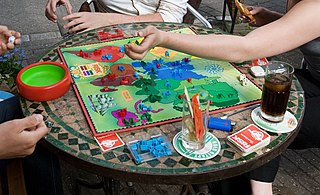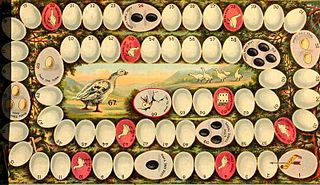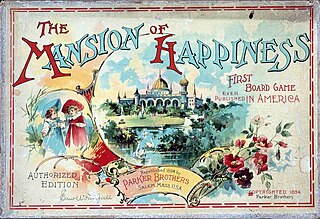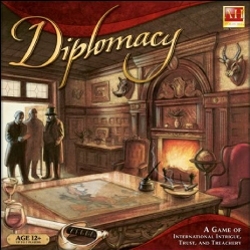
Board games are tabletop games that typically use pieces. These pieces are moved or placed on a pre-marked game board and often include elements of table, card, role-playing, and miniatures games as well.

Steve Jackson Games (SJGames) is a game company, founded in 1980 by Steve Jackson, that creates and publishes role-playing, board, and card games, and the gaming magazine Pyramid.

Risk is a strategy board game of diplomacy, conflict and conquest for two to six players. The standard version is played on a board depicting a political map of the world, divided into 42 territories, which are grouped into six continents. Turns rotate among players who control armies of playing pieces with which they attempt to capture territories from other players, with results determined by dice rolls. Players may form and dissolve alliances during the course of the game. The goal of the game is to occupy every territory on the board and, in doing so, eliminate the other players. The game can be lengthy, requiring several hours to multiple days to finish. European versions are structured so that each player has a limited "secret mission" objective that shortens the game.

Kill Doctor Lucky is a humorous board game designed by James Ernest and released in 1996 by Cheapass Games. In 1998, Kill Doctor Lucky won the Origins Award for Best Abstract Board Game of 1997.

Cluedo, known as Clue in North America, is a murder mystery game for three to six players that was devised in 1943 by British board game designer Anthony E. Pratt. The game was first manufactured by Waddingtons in the United Kingdom in 1949. Since then, it has been relaunched and updated several times, and it is currently owned and published by the American game and toy company Hasbro.

Axis & Allies is a series of World War II strategy board games. The first version was initially published in 1981 and a second edition known colloquially as Axis & Allies: Classic was published in 1984. Played on a board depicting a Spring 1942 political map of Earth divided by territories, players take the role of one or more of the five major belligerents of World War II: the Axis powers of Germany and Japan; and the Allied powers of the Soviet Union, the United Kingdom, and the United States. Turns rotate among these belligerents, who control armies of playing pieces with which they attempt to capture enemy territories, with results determined by dice rolls. The object of the game is to win the war by capturing enough critical territories to gain the advantage over the enemy.

Parker Brothers was an American toy and game manufacturer which in 1991 became a brand of Hasbro. More than 1,800 games were published under the Parker Brothers name since 1883. Among its products were Monopoly, Clue, Sorry!, Risk, Trivial Pursuit, Ouija, Aggravation, Bop It, Scrabble, and Probe. The trade name became defunct with former products being marketed under the "Hasbro Gaming" label with the logo shown on Monopoly games.

The Game of the Goose, also known as the Royal Game of the Goose is one of the first board games to be commercially manufactured. It is a race game, relying only on dice throws to dictate progression of the players. The board is often arranged in the form of a spiral, with game pieces starting on the most outward part. All spaces on the game board are numbered, with some depicting an illustration of either a goose or a hazard indicating a specified action. The aim of the game is to reach the 63rd space before any of the other players, while avoiding hazards such as the Hotel, the Bridge, and Death.

18XX is the generic term for a series of board games that, with a few exceptions, recreate the building of railroad corporations during the 19th century; individual games within the series use particular years in the 19th century as their title, or "18" plus a two or more letter geographical designator. The games 2038, set in the future, and Poseidon and Ur, 1830 BC, both set in ancient history, are also regarded as 18XX titles as their game mechanics and titling nomenclature are similar despite variance from the common railroad/stock-market theme.

The Chicago Stadium was an indoor arena in Chicago that opened in 1929, closed in 1994 and was demolished in 1995. It was the home of the National Hockey League's Chicago Blackhawks and the National Basketball Association's Chicago Bulls. It was used for numerous other sporting events, opening with a championship boxing match in March 1929. The Stadium was built by Paddy Harmon, a promoter, who sank his entire fortune into the project, only to lose control to the Stadium shareholders, and leave his family nearly penniless a year later when he died. After exiting receivership in 1935, the Stadium was owned by the Norris and Wirtz families until its closure in 1994.

Ticket to Ride is a series of turn-based strategy railway-themed Eurogames designed by Alan R. Moon, the first of which was released in 2004 by Days of Wonder. As of 2024, 18 million copies of the game have been sold worldwide and it has been translated into 33 languages. Days of Wonder has released electronic versions of the board games in the series, as well as Ticket to Ride-themed card games and puzzles.

Numerous video games based on the Jurassic Park franchise have been released. Developers Ocean Software, BlueSky Software and Sega produced various games in 1993, coinciding with the first film, Jurassic Park. In 1997, several developers, including DreamWorks Interactive and Appaloosa Interactive, produced various games for nine different platforms to coincide with the release of the film The Lost World: Jurassic Park.

The Mansion of Happiness: An Instructive Moral and Entertaining Amusement is a children's board game inspired by Christian morality. Players race about a 67-space spiral track depicting virtues and vices with their goal being the Mansion of Happiness at track's end. Instructions upon virtue spaces advance players toward the goal while those upon vice spaces force them to retreat.
Civilization is a series of turn-based strategy video games, first released in 1991. Sid Meier developed the first game in the series and has had creative input for most of the rest, and his name is usually included in the formal title of these games, such as Sid Meier's Civilization VI. There are six main games in the series, a number of expansion packs and spin-off games, as well as board games inspired by the video game series. The series is considered a formative example of the 4X genre, in which players achieve victory through four routes: "eXplore, eXpand, eXploit, and eXterminate".

Milton Bradley was an American business magnate, game pioneer and publisher, credited by many with launching the board game industry, with his eponymous enterprise, which was purchased by Hasbro in 1984, and folded in 1998.

HathiTrust Digital Library is a large-scale collaborative repository of digital content from research libraries including content digitized via Google Books and the Internet Archive digitization initiatives, as well as content digitized locally by libraries.

The history of games dates to the ancient human past. Games are an integral part of all cultures and are one of the oldest forms of human social interaction. Games are formalized expressions of play which allow people to go beyond immediate imagination and direct physical activity. Common features of games include uncertainty of outcome, agreed upon rules, competition, separate place and time, elements of fiction, elements of chance, prescribed goals and personal enjoyment.

Diplomacy is a strategic board game created by Allan B. Calhamer in 1954 and released commercially in the United States in 1959. Its main distinctions from most board wargames are its negotiation phases and the absence of dice and other game elements that produce random effects. Set in Europe in the years leading to the First World War, Diplomacy is played by two to seven players, each controlling the armed forces of a major European power. Each player aims to move their few starting units and defeat those of others to win possession of a majority of strategic cities and provinces marked as "supply centers" on the map; these supply centers allow players who control them to produce more units. Following each round of player negotiations, each player can issue attack and support orders, which are then executed during the movement phase. A player takes control of a province when the number of provinces that are given orders to support the attacking province exceeds the number of provinces given orders to support the defending province.
Cluedo, known as Clue in North America, is a murder mystery-themed multimedia franchise started in 1949 with the manufacture of the Cluedo board game. The franchise has since expanded to film, television game shows, book series, computer games, board game spinoffs, a comic, a play, a musical, jigsaws, card games, and other media.

















